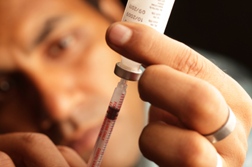 But it's also good business to know human nature, and the makers of Byetta know that most people don't like needles. As much as Byetta may be necessary for the treatment of type 2 diabetes, most people would rather not have to deal with twice-daily injections.
But it's also good business to know human nature, and the makers of Byetta know that most people don't like needles. As much as Byetta may be necessary for the treatment of type 2 diabetes, most people would rather not have to deal with twice-daily injections.So one can imagine the attraction of a diabetes drug that would only have to be injected once a week.
That's the promise of Bydureon, which is as good as approved, assuming a favorable decision from the US Food and Drug Administration (FDA) on October 22. According to the Minyanville financial blog from 8/06/10, analysts predict Bydureon could bring in a maximum of about $2 billion per year for manufacturers Amylin and Eli Lilly.
But there's a third partner in Bydureon: Alkermes is responsible for the technology that will make Bydureon long-lasting. It is Alkermes that diabetics will thank for the relief of once-weekly injections.
Investors may be thanking their financial consultants for their sage advice to invest in Alkermes. Why? By its own admission, Alkermes will receive an eight percent royalty for the first 40 million units of Bydureon sold each year, with a 5.5 percent royalty for units sold beyond that number. From anticipated sales of $2 billion, Alkermes' share would be $160 million, based on a price point similar to that of Byetta.
READ MORE BYETTA LEGAL NEWS
In other news, ever wonder where the formulations for Byetta come from?
The risk of Byetta acute pancreatitis comes from a drug that traces its roots to lizard saliva. According to the 8/31/10 edition of the Express, scientists discovered that the saliva of the two-foot pink-and-grey Gila lizard contains the chemical exendin-4, which is similar to the human hormone that regulates blood sugar. Given that the venomous lizard, native to the US and Mexico, eats only three or four times a year, the exendin-4 in its saliva helps it digest meals very slowly. That discovery led to a three-year study by the University of North Carolina, which found a synthetic form of exendin-4 called exenatide, known commercially as Byetta.
